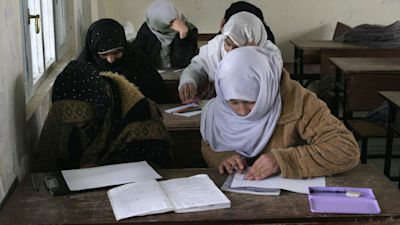Girls in secondary school turn up to school in Afghanistan only for Taliban to change mind on policy

ITV News International Affairs Editor Rageh Omaar reports on the unexpected U-turn
The Taliban has shocked Afghanistan after unexpectedly cancelling the reopening of schools to girls aged over 11.
The move reneges on a promise made when they took over the country in favour of appeasing their hard-line base at the expense of further alienating the international community.
It is is bound to disrupt efforts by the Taliban to win recognition from potential international donors at a time when the country is mired in a worsening humanitarian crisis.
The international community has urged Taliban leaders to reopen schools and give women their right to public space.
The reversal was so sudden that the Education Ministry and several schools were caught off guard on Wednesday. Some girls in higher grades returned to schools, only to be told to go home.
Aid organisations said the move exacerbated the uncertainty surrounding Afghanistan's future as the Taliban leadership seems to struggle to get on the same page as it shifts from fighting to governing.
Waheedullah Hashmi, external relations and donor representative with the Taliban-led administration, said the decision was made late Tuesday night.
“We don’t say they will be closed forever,” Hashmi added.
The religiously driven Taliban administration fears going forward with enrolling girls beyond the sixth grade could alienate their rural base, Hashmi said.
“The leadership hasn't decided when or how they will allow girls to return to school,” he said.
While he accepted that urban centres are mostly supportive of education for girls, much of rural Afghanistan is opposed, particularly in Pashtun tribal regions.
In some rural areas, a brother will disown a city-dwelling brother who allows a daughter to go to school, said Hashmi, adding that the Taliban leadership is trying to decide how to open education for girls beyond the sixth grade nationwide.
Earlier in the week, a statement by the Education Ministry had urged “all students” to return when classes resumed Wednesday.
On Tuesday, ministry spokesman Mawlvi Aziz Ahmad Rayan said that all girls would be allowed back to school, although the Taliban administration would not insist on it in those areas where parents were opposed or where schools could not be segregated.
He was reluctant to give details but promised if schools can meet these conditions, “there would no issue for them” to begin classes for girls in the higher grades.
"In principle, there is no issue from the ministry side, but as I said, it is a sensitive and cultural issue,” he added.
The decision to postpone the return of girls at the higher grade levels appeared to be a concession to the rural and deeply tribal backbone of the hard-line Taliban movement that in many parts of the countryside are reluctant to send their daughters to school.
US Special Representative Thomas West tweeted his “shock and deep disappointment” about the decision, calling it “a betrayal of public commitments to the Afghan people and the international community.”
He said the Taliban had made it clear that all Afghans have a right to education, adding: “For the sake of the country’s future and its relations with the international community, I would urge the Taliban to live up to their commitments to their people.”
The Norwegian Relief Committee, which spends about $20 million annually to support primary education in Afghanistan, was still waiting for official word from the Taliban about cancelling the classes for girls above 11 years old.
Berenice Van Dan Driessche, advocacy manager for the committee, said their representatives had not gotten official word of the change as of Wednesday night, and that girls in the 11 provinces where they work had gone to school but were sent home.
The committee's staff in the provinces “reported a lot of disappointment and also a lot of uncertainty” about the future, she said. It said that in some areas, teachers said they would continue to hold classes for the girls until the Taliban issued an official order.
Girls have been banned from school beyond the sixth grade - equivalent to year seven in the UK - in most of the country since the Taliban's return.
Universities opened earlier this year in much of the country, but since taking power the Taliban edicts have been erratic.
While a handful of provinces continued to provide education to all, most provinces closed educational institutions for girls and women.
In the capital of Kabul private schools and universities have operated uninterrupted.